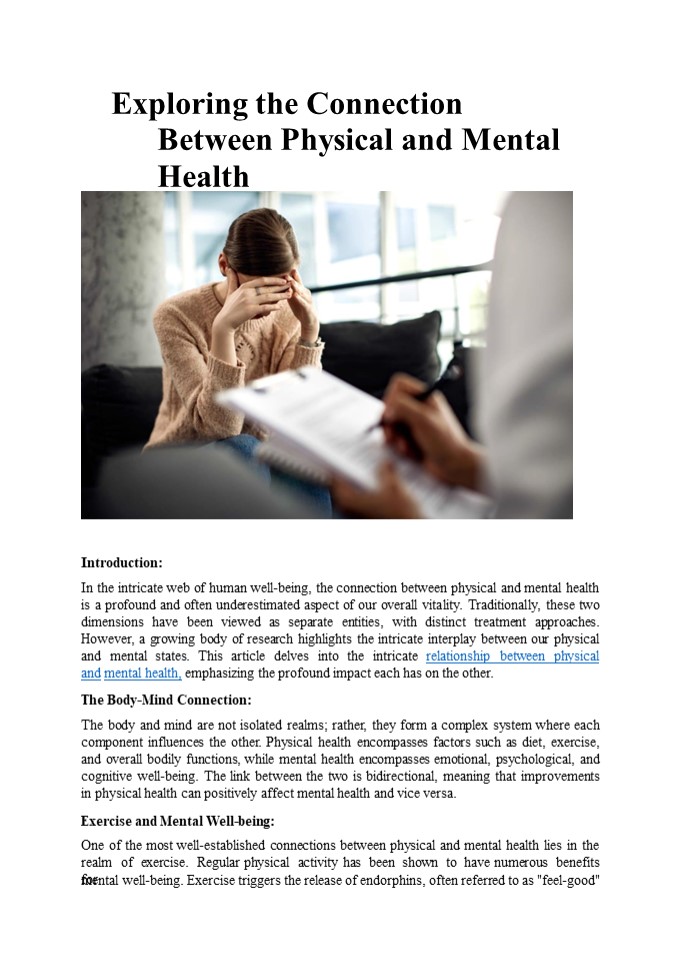Exploring the Connection Between Physical and Mental Health - PowerPoint PPT Presentation
Title:
Exploring the Connection Between Physical and Mental Health
Description:
In the intricate web of human well-being, the connection between physical and mental health is a profound and often underestimated aspect of our overall vitality. Traditionally, these two dimensions have been viewed as separate entities, with distinct treatment approaches. However, a growing body of research highlights the intricate interplay between our physical and mental states. This article delves into the intricate relationship between physical and mental health, emphasizing the profound impact each has on the other. – PowerPoint PPT presentation
Number of Views:4
Title: Exploring the Connection Between Physical and Mental Health
1
Exploring the Connection Between Physical and
Mental Health
Introduction In the intricate web of human
well-being, the connection between physical and
mental health is a profound and often
underestimated aspect of our overall vitality.
Traditionally, these two dimensions have been
viewed as separate entities, with distinct
treatment approaches. However, a growing body of
research highlights the intricate interplay
between our physical and mental states. This
article delves into the intricate
relationship between physical and mental
health, emphasizing the profound impact each has
on the other. The Body-Mind Connection The body
and mind are not isolated realms rather, they
form a complex system where each component
influences the other. Physical health encompasses
factors such as diet, exercise, and overall
bodily functions, while mental health encompasses
emotional, psychological, and cognitive
well-being. The link between the two is
bidirectional, meaning that improvements in
physical health can positively affect mental
health and vice versa. Exercise and Mental
Well-being One of the most well-established
connections between physical and mental health
lies in the realm of exercise. Regular
physical activity has been shown to have
numerous benefits for
mental well-being. Exercise triggers the release
of endorphins, often referred to as "feel-good"
2
hormones, which can alleviate symptoms of
depression and anxiety. Additionally, engaging in
physical activity promotes better sleep, reduces
stress, and enhances cognitive function, all of
which contribute to improved mental
health. Nutrition and Cognitive Function The
food we consume plays a pivotal role in
shaping both our physical and mental health.
Nutrient-rich diets not only support physical
well-being but also have a profound impact on
cognitive function. For instance, omega-3 fatty
acids found in fish have been linked to lower
rates of depression, while antioxidants in
fruits and vegetables contribute to overall
brain health. Conversely, poor nutrition can lead
to physical ailments that may exacerbate mental
health issues. Sleep and Emotional
Stability Quality sleep is a cornerstone of good
physical health, but its significance extends to
mental well-being as well. Chronic sleep
deprivation can lead to mood disturbances,
increased stress levels, and a heightened
susceptibility to mental health disorders. On the
flip side, addressing sleep issues can often
contribute to the alleviation of symptoms in
individuals dealing with mental health
challenges. Stress, Cortisol, and the Mind The
body's response to stress, mediated by the
release of cortisol, illustrates another facet of
the physical-mental health connection.
Chronic stress can have detrimental effects
on both physical and mental well-being.
Prolonged elevation of cortisol levels is
associated with conditions such as
cardiovascular disease, while it also contributes
to anxiety and depression. Managing stress
through techniques like mindfulness and
relaxation exercises not only benefits
physical health but also promotes mental
resilience. The Role of Social Interaction Human
beings are inherently social creatures, and
the quality of our social interactions
profoundly influences both our physical and
mental health. Strong social connections
contribute to a sense of belonging and
support, reducing the risk of mental health
issues. Conversely, social isolation and
loneliness are associated with adverse physical
and mental health outcomes. Recognizing and
nurturing social bonds is thus crucial for
maintaining overall well-being. The Impact of
Mental Health on Physical Health Just as
physical health influences mental well-being,
the reverse is also true. Individuals
grappling with mental health challenges
may experience physical symptoms and
complications. For example, chronic
stress and anxiety can manifest as
headaches, gastrointestinal issues, or even
cardiovascular problems. Addressing mental health
concerns is, therefore, essential not only
for emotional well-being but also for
maintaining optimal physical health. Conclusion
In the intricate dance between physical and
mental health, each step influences the
other, creating a dynamic interplay that shapes
our overall well-being. Recognizing and
appreciating
the connection between these two dimensions is
crucial for fostering a holistic approach to
3
health care. Whether through regular exercise,
balanced nutrition, adequate sleep, or nurturing
social connections, interventions that benefit
physical health concurrently contribute to mental
well-being and vice versa. As we continue to
explore the intricate relationship between our
bodies and minds, a comprehensive
understanding emergesone that underscores
the importance of caring for both aspects to
achieve true health and vitality.































